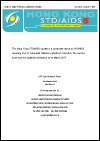What's New
Displaying results 2151 - 2160 of 4899
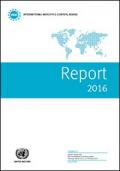
Resource | Publications,
This year’s report, together with the annual report on precursors, provides an up-to-date analysis on developments in global drug control, as well as recommendations to Governments and relevant international and regional organizations. In the light of the discussions surrounding the thirtieth special session of the General Assembly, the Board’s recommendations in our 2016 publications are aimed at helping States take effective measures and implement comprehensive plans to tackle drug-related challenges. In the report on precursors,2 for example, guidance and information are provided to enable States to enhance information-sharing, develop multilateral operational cooperation and implement measures for preventing the diversion of chemicals used in the illicit manufacture of drugs.
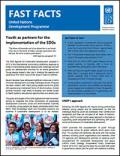
Resource | Publications,
Recent decades have witnessed significant advances in terms of human development, but deep challenges remain. Progress has been uneven, with many young people across the globe still experiencing interlocked forms of discrimination, limited political inclusion, high levels of poverty, and limited access to health systems, educational opportunities and decent jobs.
The goals and targets of the 2030 Agenda are interconnected, aiming to integrate the three dimensions of sustainable development: economic, social and environmental. Explicitly or implicitly, young people are deeply embedded within their fabric. Their knowledge, reach and innovative solutions are essential if sustainable development is to be realized.
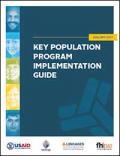
Resource | Guidelines,
Key populations — sex workers (SWs), gay men and other men who have sex with men (MSM), transgender people (TG), and people who inject drugs (PWID) — are disproportionately affected by HIV. At the same time, the stigma, discrimination, and threat of criminal prosecution faced by key populations around the world pose serious barriers to their ability to access high-quality, rights-based health care.
This implementation guide will be useful for LINKAGES staff members wherever the program is operating, and for organizations that implement the LINKAGES program at the local level ("on the ground"). Although the guide may help partners working with LINKAGES at the country level, such as Ministries of Health, the guide is designed for LINKAGES country programs. The guide is not exhaustive. It does not cover every intervention that could be useful, and it does not go into great detail about every aspect of an intervention. Instead, it aims to give information on the essential elements of the LINKAGES program, and to help standardize country programs based on proven, high-quality interventions from other countries.
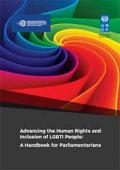
Resource | Tools,
Advancing the Human Rights and Inclusion of LGBTI People: A Handbook for Parliamentarians has been jointly produced by the United Nations Development Programme (UNDP) and Parliamentarians for Global Action (PGA). This Handbook sets out relevant human rights frameworks and highlights the role of parliamentarians in implementing Agenda 2030, to ensure no one, including LGBTI people, is left behind. It offers practical tips, tools and resources designed to support parliamentarians to undertake legislative, representational and oversight activities that advance the rights and inclusion of LGBTI people.
A wide range of diverse examples are presented, each reflecting concrete efforts undertaken by parliamentarians in every region of the world in support of the human rights and inclusion of LGBTI people. These examples provide valuable insights and lessons learned. They vary in approach and style, as the context and strategies employed are context driven. Some of the examples may be relevant in a wide range of countries, while others may have a more limited applicability.
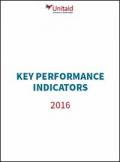
Resource | Publications,
Unitaid analyses performance against its Key Performance Indicators (KPIs), publishing a KPI report in June each year, based on results during the preceding calendar year. This report presents Unitaid’s results for 2016, towards achieving the six strategic objectives outlined in Unitaid’s Strategy for 2013-2016; thus it reflects organizational performance during the final year of the strategic period.
As Unitaid moves into a new strategic period, it also takes note of important lessons learned during 2013-2016. The most critical of these is the need for increased focus on the transition and scale-up of Unitaid-supported products and approaches, both within and beyond project countries. Supporting this, to ultimately deliver impact at scale, it is critical to define, approve, monitor and evaluate investments underpinned by a sound Theory of Change, fit-for-purpose log frame, and clear operational plan. Stronger planning can minimize delays in implementation, improve project delivery and increase focus on the transition and scale-up of Unitaid’s investments, to ultimately deliver a more effective global response.
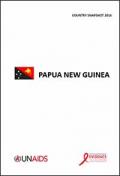
Resource | Reviews and Snapshots,
The report prepared by UNAIDS Regional Support Team for Asia and the Pacific and AIDS Data Hub provides information on the HIV epidemic and response in Papua New Guinea country.
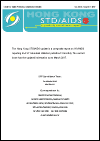
Resource | Publications,
The Hong Kong STD/AIDS update is a composite report on HIV/AIDS reporting and STI caseload statistics published 3 monthly. The current issue has the updated information up to March 2017.
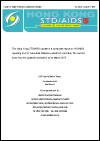
Resource | Publications,
The Hong Kong STD/AIDS update is a composite report on HIV/AIDS reporting and STI caseload statistics published 3 monthly. The current issue has the updated information up to June 2017.
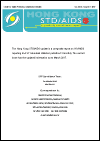
Resource | Publications,
The Hong Kong STD/AIDS update is a composite report on HIV/AIDS reporting and STI caseload statistics published 3 monthly. The current issue has the updated information up to September 2017.






